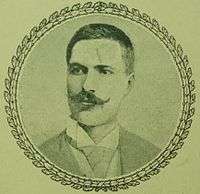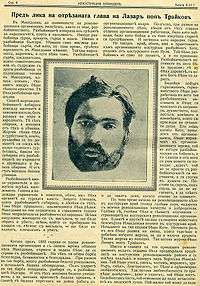Lazar Poptraykov
Lazar Poptraykov (Bulgarian: Лазар Поптрайков) (10 April 1878–October 1903) was a Bulgarian revolutionary (komitadji) and poet.[1][2] He was one of the leaders of the Internal Macedonian-Adrianople Revolutionary Organization (IMARO) in the region of Kastoria (Kostur) during the Ilinden Uprising. Despite his Bulgarian identification,[3][4][5] per post-WWII Macedonian historiography he was an ethnic Macedonian.[6][7][8]

Life

Lazar Poptraykov was born in Dambeni, Ottoman Empire (now Dendrohori, Greece) on 10 April 1878.[9] He studied at the local village school before moving to the Bulgarian junior high school in Kostur.[10] Later he continued to study at the Bitola Bulgarian Classical High School and afterwards at Thessaloniki's Bulgarian Men High School.[11][12] In Thessaloniki, one of his teachers was Pere Toshev. Poptraykov joined IMARO as early as 1895, inspired by Dame Gruev.[13] He finished the Bulgarian Men's High School of Thessaloniki in 1898,[14] though he had started touring the Kastoria region to promote the work of IMARO two years earlier, in 1896.[15]
Poptraykov was one of the founders of the Kastoria branch of IMARO. On 21 June 1903 he wrote a poem titled Lokvata and Vinyari (Bulgarian: Локвата и Виняри) to commemorate the battle of Lokvata between Bulgarian and Ottoman troops in Dendrohori during the Ilinden Uprising.[9] His poem had large impact on the national identification of the villagers of Dendrohori whose allegiance to Bulgaria increased during the following years.[9] Poptraykov was arrested by Ottoman authorities and imprisoned in Korçë along with fellow revolutionaries Manol Rozov, Maslina Grancharova, and Pavel Christov. Poptraykov died at the start of the Macedonian Struggle when he was assassinated by Konstantinos Christou who was acting under orders by Germanos Karavangelis, bishop of Kastoria.[16] Per Karavangelis Poptraykov was the worst enemy of Hellenism, who fanatized the peasants in favor of the Bulgarian national idea.[17] Christou who switched the side from Bulgarians to Greeks and vice versa, was received back by the IMRO at the insistence of Poptraykov. However, after Poptraykov had been wounded and taken a refuge with Kottas, he used the opportunity to kill him and present his head to Karavangelis who took a picture of the head on his desk.[16]
Literature
- Лазар Поптрайков - "Възстанието в Костурско; от 20 юлий до 30 август вкл.", публикувано в "Бюлетин на в. Автономия; Задграничен лист на Вътрешната македоно-одринска организация", брой 44-47, София, 1903 година Report about the Ilinden uprising written by Lazar Poptraykov, Vasil Chakalarov, Manol Rozov, Pando Klyashev and Mihail Nikolov
Sources
- Macedonia: The Politics of Identity and Difference, Anthropology, Culture, and Society. Jane K. Cowan, Pluto Press, 2000, ISBN 0745315895, p. 74.
- Macedonia: documents and material, Institut za istoria, Institut za bŭlgarski ezik, Voin Bozhinov, Li͡u͡bomir Panaĭotov, Bulgarian Academy of Sciences, 1978, p. 11.
- Initially the membership in the IMRO was restricted only for Bulgarians. Its first name was "Bulgarian Macedonian-Adrianople Revolutionary Committees", which was later changed several times. IMRO was active not only in Macedonia but also in Thrace (the Vilayet of Adrianople). Since its early name emphasized the Bulgarian nature of the organization by linking the inhabitants of Thrace and Macedonia to Bulgaria, these facts are still difficult to be explained from the Macedonian historiography. They suggest that IMRO revolutionaries in the Ottoman period did not differentiate between ‘Macedonians’ and ‘Bulgarians’. Moreover, as their own writings attest, they often saw themselves and their compatriots as ‘Bulgarians’. All of them wrote in standard Bulgarian language. For more see: Brunnbauer, Ulf (2004) Historiography, Myths and the Nation in the Republic of Macedonia. In: Brunnbauer, Ulf, (ed.) (Re)Writing History. Historiography in Southeast Europe after Socialism. Studies on South East Europe, vol. 4. LIT, Münster, pp. 165-200 ISBN 382587365X.
- Васил Чекаларов: Дневник 1901-1903 г. Съставителство Ива Бурилкова, Цочо Билярски. (ИК „Синева” София, 2001). ISBN 9549983110, стр. 122.
- Дневници и спомени за Илинденско-Преображенското въстание, Съставители: Здравка Нонева и др. Редактори: Любомир Атанасов Панайотов и др. Главно управление на архивите на Министерския съвет, Издателство на Отечествения фронт, София, 1984 г. стр. 151-224.
- The origins of the official Macedonian national narrative are to be sought in the establishment in 1944 of the Yugoslav Republic of Macedonia. This open acknowledgment of the Macedonian national identity led to the creation of a revisionist historiography whose goal has been to affirm the existence of the Macedonian nation through the history. Macedonian historiography is revising a considerable part of ancient, medieval, and modern histories of the Balkans. Its goal is to claim for the Macedonian peoples a considerable part of what the Greeks consider Greek history and the Bulgarians Bulgarian history. The claim is that most of the Slavic population of Macedonia in the 19th and first half of the 20th century was ethnic Macedonian. For more see: Victor Roudometof, Collective Memory, National Identity, and Ethnic Conflict: Greece, Bulgaria, and the Macedonian Question, Greenwood Publishing Group, 2002, ISBN 0275976483, p. 58; Victor Roudometof, Nationalism and Identity Politics in the Balkans: Greece and the Macedonian Question in Journal of Modern Greek Studies 14.2 (1996) 253-301.
- Yugoslav Communists recognized the existence of a Macedonian nationality during WWII to quiet fears of the Macedonian population that a communist Yugoslavia would continue to follow the former Yugoslav policy of forced Serbianization. Hence, for them to recognize the inhabitants of Macedonia as Bulgarians would be tantamount to admitting that they should be part of the Bulgarian state. For that the Yugoslav Communists were most anxious to mold Macedonian history to fit their conception of Macedonian consciousness. The treatment of Macedonian history in Communist Yugoslavia had the same primary goal as the creation of the Macedonian language: to de-Bulgarize the Macedonian Slavs and to create a separate national consciousness that would inspire identification with Yugoslavia. For more see: Stephen E. Palmer, Robert R. King, Yugoslav communism and the Macedonian question, Archon Books, 1971, ISBN 0208008217, Chapter 9: The encouragement of Macedonian culture.
- The past was systematically falsified to conceal the fact that many prominent ‘Macedonians’ had supposed themselves to be Bulgarians, and generations of students were taught the pseudo-history of the Macedonian nation. The mass media and education were the key to this process of national acculturation, speaking to people in a language that they came to regard as their Macedonian mothertongue, even if it was perfectly understood in Sofia. For more see: Michael L. Benson, Yugoslavia: A Concise History, Edition 2, Springer, 2003, ISBN 1403997209, p. 89.
- Cowan, Jane (2000). Macedonia: the politics of identity and difference. Pluto Press. p. 74. ISBN 0-7453-1589-5.
- Георги Бистрицки. Българско Костурско, Ксанти, 1919, стр. 52.
- Конески, Блаже (1979). Коментар кон преводот на поемата на Лазар Поп Трајков: Поп Трајков Л., Локвата и Вињари (in Macedonian). Скопје: Библиоетека "Современост", Кн. 49.
- Борис, Николов; Владимир Овчаров (2005). Спомени на Владимир Карамфилов за просветното дело и революционните борби в гр. Прилеп (in Bulgarian). ИК "Звезди". p. 9.
- Киселиновски Ст., ed. (2000). "Поп Трајков, Лазар". Македонски историски речник (in Macedonian). Скопје: Институт за национална историја.
- Кандиларовъ, Георги Ст. Българскитѣ гимназии и основни училища въ Солунъ (по случай на 50-годишнината на солунскитѣ български гимназии). София, Македонски Наученъ Институтъ, печатница П. Глушковъ, 1930. с. 95.
- "Поптрайков, Лазар". Енциклопедия България (in Bulgarian). София: Издателство на Българската академия на науките. 1986.
- Fortescue, Adrian (2004). The Orthodox Eastern Church. Kessinger Publishing. p. 344. ISBN 1-4179-1060-7.
- Македонската борба (Спомени), Германос Каравангелис. ИК „Синева”. (София, 2001) Превод от гръцки: Илия Корбец. ISBN 9549983110, стр. 343.